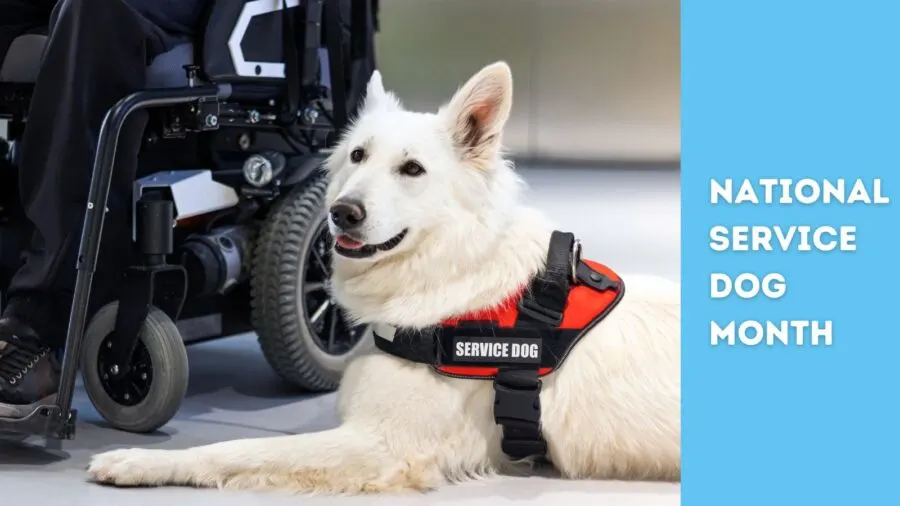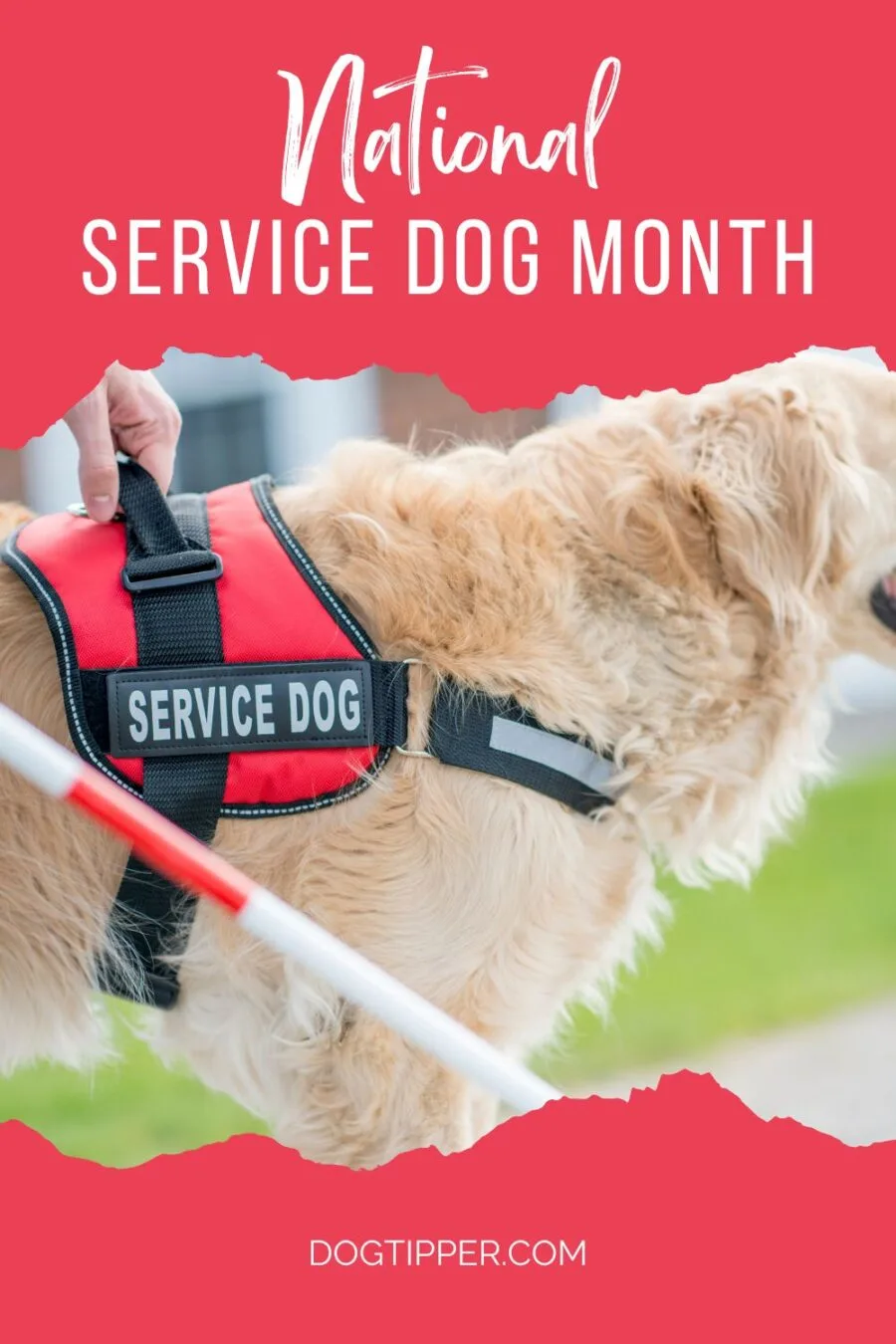September marks National Service Dog Month, a time dedicated to celebrating and recognizing these extraordinary animals that transform lives daily. From guiding the visually impaired and detecting medical conditions to providing emotional support and assisting with mobility, service dogs exhibit unparalleled dedication and capabilities.
This month, let’s honor their invaluable contributions, raise awareness about their training and roles, and express our gratitude for the profound impact they have on individuals and communities alike. Join us in this tribute to these unsung heroes on four legs. 🐾

Let’s have a look at the many types of service dogs, how service dogs differ from emotional support and pet dogs and how we can advocate for the rights of service dogs and their handlers.
Types of Service Dogs
Service dogs can be trained to perform a wide range of tasks, depending on the needs of their handlers. Here is a list of specific tasks that service dogs might be trained to do:
General Tasks
- Provide balance and support.
- Carry medical supplies.
- Activate emergency response systems.
- Fetch a telephone or other communication devices.
Mobility Assistance
- Retrieve dropped items.
- Open/close doors.
- Turn lights on/off.
- Assist in transferring from a wheelchair.
- Brace/support when standing or walking.
- Pull a wheelchair.
Hearing Dogs for the Deaf
- Alert to specific sounds like doorbells, alarms, phone rings.
- Indicate the direction of the sound.
- Wake up the handler when an alarm goes off.
Guide Dogs for the Visually Impaired
- Navigate around obstacles.
- Stop at curbs and steps.
- Avoid overhanging obstacles like branches.
- Locate and lead to specific destinations or objects.
Diabetic Alert Dogs
- Detect changes in blood sugar levels by scent.
- Alert the handler to high or low blood sugar.
- Retrieve glucose tablets or insulin.
Seizure Alert/Response Dogs
- Predict and alert the handler to an oncoming seizure.
- Protect the handler during a seizure.
- Retrieve or activate a medical alert system.
- Fetch medications.
Autism Support Dogs
- Prevent bolting or wandering.
- Calm the handler during meltdowns or episodes of distress.
- Interrupt repetitive behaviors.
- Facilitate social interactions.
PTSD (Post-Traumatic Stress Disorder) Service Dogs
- Remind the handler to take medication.
- Interrupt nightmares.
- Provide grounding during anxiety or panic attacks.
- Create a physical barrier between the handler and others.
- Scan rooms or turn on lights before the handler enters.
Allergy Detection Dogs
- Sniff out and alert to the presence of specific allergens.
Cardiac Alert Dogs
- Detect changes in heart rhythms.
- Alert the handler to potential heart events.
Psychiatric Service Dogs
- Interrupt self-harming behaviors.
- Provide tactile stimulation to soothe the handler.
- Assist during episodes of disorientation or derealization.
Respiratory Alert Dogs
- Alert to changes indicating respiratory distress or attacks.
Remember, each service dog is trained according to the specific needs of their handler. This list isn’t exhaustive, and as training techniques develop and the needs of people with disabilities evolve, service dogs may be trained for even more specific and diverse tasks.
Service Dogs vs. Emotional Support Dogs and Therapy Dogs
There’s always confusion with some dog lovers when it comes to the different roles–and rights–of service dogs, emotional support dogs and therapy dogs. Let’s have a look at each:
| Criteria | Service Dogs | Emotional Support Dogs | Therapy Dogs |
|---|---|---|---|
| Purpose | Assist individuals with disabilities in day-to-day tasks | Provide emotional comfort to an individual with a psychological or emotional condition | Provide comfort and healing to multiple individuals, often in institutional settings |
| Training | Rigorous task-specific training | Basic obedience; no special tasks | Obedience training, often receive additional training to work in therapeutic environments |
| Public Access Rights | Allowed in public places where pets are not permitted under ADA (e.g., restaurants, stores) | No specific public access rights beyond housing and some airlines | No universal public access rights; only permitted in places they are invited to work |
| Certification & Documentation | Not required by ADA, but some organizations provide certifications | Requires a letter from a licensed mental health professional for certain rights | Many organizations provide certification after evaluation |
| Protective Laws | ADA (Americans with Disabilities Act) in the U.S. | Fair Housing Act and Air Carrier Access Act in the U.S. | No federal protective laws; some states have laws recognizing therapy dogs |
| Vest or ID | Often wear vests or IDs for clarity but not mandatory | May wear vest or ID, but not mandatory | Often wear vests or IDs indicating they are therapy animals |
| Typical Locations | Anywhere the handler goes | Handler’s home or on approved airlines | Hospitals, schools, nursing homes, rehabilitation centers, etc. |
| Interaction with Public | Generally, the public should not touch or interact without permission | Same as typical pets, unless handler indicates otherwise | Encouraged to interact with multiple individuals when “on duty” |
| Ownership | Owned by an individual with a disability or organization | Owned by individuals seeking emotional support | Can be owned by individual handlers or institutions |
Note: Laws and regulations can differ from country to country, and even within different regions of a country. The above details are mostly centered on U.S. regulations.
How You Can Advocate for Service Dogs
Advocating for the rights of service dogs and their handlers is crucial, as it ensures accessibility, respect, and understanding within the community–both during National Service Dog Month and year around.
Here are some steps dog lovers can take to champion this cause:
Educate Yourself and Others
- Learn about the different types of service animals and their roles.
- Understand the legal rights of service dogs and their handlers under laws such as the Americans with Disabilities Act (ADA) or equivalent legislation in other countries.
Raise Awareness
- Share stories and information on social media.
- Write articles, blogs, or letters to the editor in local newspapers.
- Host or attend workshops and seminars on the topic.
Respect Boundaries
- Teach others not to pet, feed, or distract service dogs when they’re working.
- Educate about the importance of not asking invasive or personal questions to the handlers.
Support Access Rights
- If you witness a service dog and handler being denied access to a public place, offer to be a witness or provide support.
- Familiarize yourself with the correct protocol for businesses to determine if a dog is a service animal.
Support Organizations
- Donate to or volunteer with organizations that train service dogs or advocate for the rights of handlers.
- Sponsor a service dog in training.
Challenge Misinformation
- If you hear misconceptions or stereotypes about service dogs or their handlers, kindly provide accurate information.
- Report fake service dog activities. Misrepresentation of pets as service animals can undermine the rights of legitimate service dog handlers.
Engage with Local Businesses
- Encourage businesses to post signs welcoming service dogs.
- Provide them with resources or information on how to interact with service dogs and their handlers.
Advocate for Stronger Legislation
- If your country or state lacks comprehensive laws protecting the rights of service dogs and handlers, lobby for stronger regulations.
- Connect with legislators to understand their stance on service animals and educate them about the importance of these dogs.
Build a Community
- Start or join local advocacy groups focused on service dog rights.
- Collaborate with other advocates to organize events, awareness campaigns, or support groups for handlers.
By actively promoting understanding, empathy, and respect for service dogs and their handlers, dog lovers can play an integral role in ensuring that these exceptional animals and the people who rely on them are treated with the dignity they deserve.
Related Posts
International Assistance Dog Week
Is That a Real Service Dog? | Infographic
NFL Star Eric Decker Helps Vets in Need of Service Dogs
Pin it to remember National Service Dog Month

- Review: Jimmy BX7 Pro Anti-Mite Vacuum Cleaner - December 16, 2024
- 🎉 GIVEAWAY: Lord of the Pets Portrait of Your Dog! - November 26, 2024
- Review: Lord of the Pets Portraits - November 17, 2024
